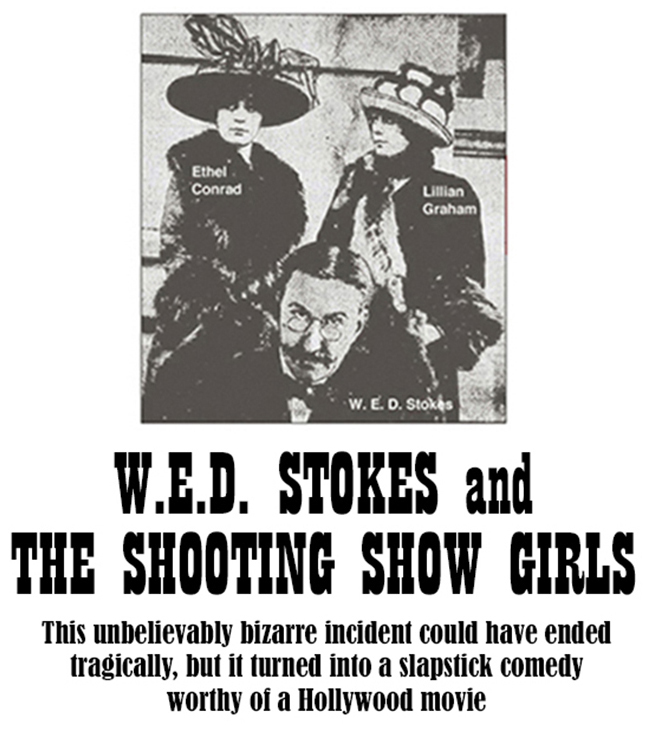| HOME |
 |
 |
William Earl Dodge Stokes couldn't get it straight: Retrieve the embarrassing love letters to your old girl friends BEFORE you get married. He waited until four months afterward and wound up getting shot three times. Despite the potential for tragedy, the evening was widely viewed as farce, and with good reason. This is the stuff that inspired Hollywood's screwball comedies. In some ways it resembles "Roxy Hart" and the subsequent musical, "Chicago." Lillian Graham, an aspiring singer and dancer, was befriended by W. E. D. Stokes a few years earlier after she and her married sister, Stella Singleton, checked into the Hotel Ansonia. At one time she may have entertained hopes of marrying Stokes, but seemed to resign herself to being a girl friend on retainer. She and Stokes exchanged many letters; in most of hers she asked for money. Stokes had told her he was forbidden by law to remarry. In February 1911, of course, he and Helen Ellwood did get married, in New Jersey. I've seen nothing about the effects of this marriage on Lillian Graham, but it may be safe to assume she was hurt and angry. In the meantime she had befriended by Ethel Conrad, also a would-be actress who may have concocted a blackmail plot against Stokes, using letters he had written to Graham. Conrad visited Stokes at his office at least once. She claimed one visit was an errand of mercy, asking Stokes for help because Graham had attempted suicide. She said Stokes advised her to end her friendship with Graham, and claimed Stokes made several derogatory remarks about Graham and her family. Conrad also said Stokes complimented her on her looks. He also agreed to help her find a job. STOKES CLAIMED Conrad later contacted him to say Graham was on her way to Europe and suggested he visit to apartment to retrieve his letters. He said that when he showed up at the apartment, Graham was there, and that both women confronted him and demanded $25,000 for the letters. The women told a far different story. Both Graham and Conrad had recently purchased revolvers and insisted they used them on Stokes in self-defense. He was hit three times in his legs, but suffered no life-threatening wounds. He wound up in a hospital, the young women went to jail ... but a day later they were bailed out by an enterprising vaudeville promoter who immediately booked them as New York City's latest act. |
|
|
First impression, at least in the case of Mildred Conrad, was deceiving. On the night of her arrest she may have seemed scared and reluctant to talk, but in the trial later that year, Conrad emerged as a defiant, brassy opportunist with an interesting past, though tame compared with the life W. E. D. Stokes had led. Lillian Graham and Ethel Conrad were arraigned the next day and Stokes remained in the hospital. Injuries suffered at the hands of the three Japanese servants would turn out to be worse than damage caused by the gunshots. Stokes admitted he had had a relationship with Miss Graham and had made her sign a paper in which she admitted having other lovers. He also lured her to his horse farm in Lexington, Ky., where she claimed she was held as a virtual prisoner. As for Stokes, well being shot three times, then beaten by three men ... well, that's obviously no laughing matter. But the "Shooting Show Girls" fiasco was widely regarded as a joke and hospital reports of Stokes' conditions were suspect ... because there were those who felt, with good reason, that Stokes was – and would remain – as sick as it was convenient for him to be. |
|
| HOME | CONTACT |
